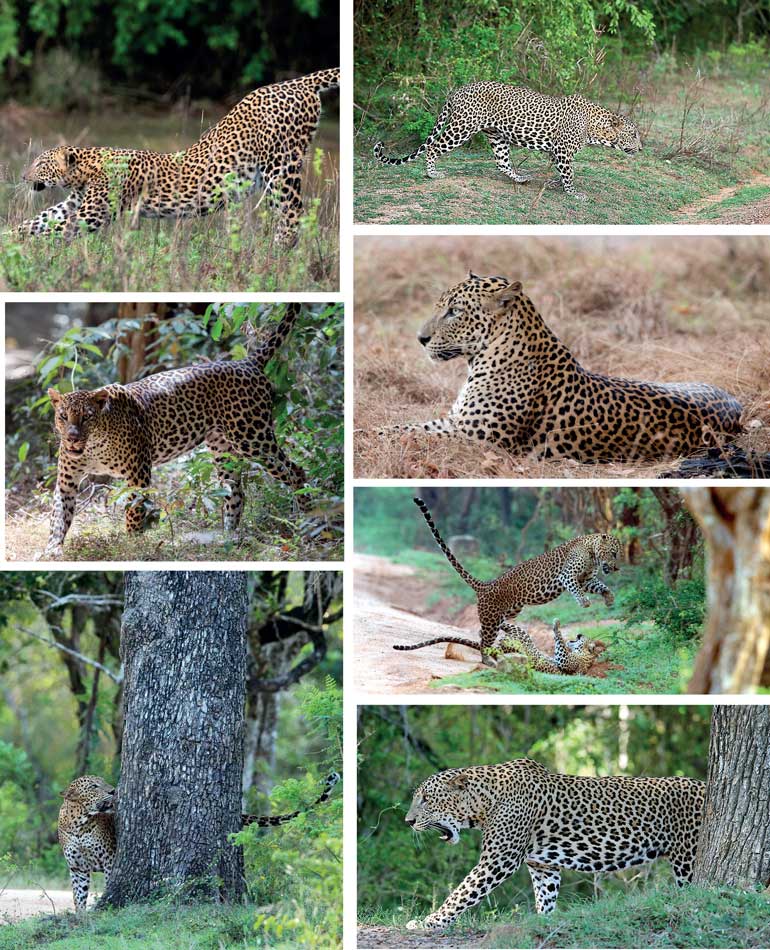Friday Feb 27, 2026
Friday Feb 27, 2026
Tuesday, 9 January 2018 00:00 - - {{hitsCtrl.values.hits}}

The Wildlife and Nature Protection Society Monthly Lecture on 18 January 2018 will focus on ‘Social life and survival strategies of Sri Lankan leopards” with an expert presentation by Rukshan Jayawardene at 6.00 p.m. at the Cinema Hall, BMICH, Bauddhaloka Mawatha, Colombo 7.
The Wildlife and Nature Protection Society Monthly Lecture is open to all members and non-members, admission free
WNPS said leopards are mammalian carnivores at the apex of the food chain in this island. They not only feed on large herbivores like sambhur and buffaloes but feed on dozens of other species both large and small including reptiles and amphibians. They don’t only feed on little creatures such as mice and frogs to subsist when food is scarce but consistently will kill and eat small prey opportunistically. 
Highly-adaptable and versatile in both diet and habitat preference leopards live in marginal areas where other large cats have been long extirpated from. The leopards’ adaptive radiation throughout Asia and Africa is one of the great success stories of mammalian evolution. With a long association with humans from a time that the leopard was not quite a leopard and humans were not quite human, today it seems that leopards have learnt more about us than we have learnt about them.
Primarily leopards have realised that humans are best avoided as they pose an ever-present danger. However leopards are able to live in close proximity to human settlements even urban areas and live on livestock pets and suitable refuse especially when those very humans have depleted the leopards’ natural prey base, by habitat destruction and hunting.
We have always underestimated leopards and do not give this intelligent, adaptable cat enough credit for living as our neighboursin many areas of this country mostly unknown and unseen by their human neighbours. The human-leopard conflict however is a growing problem in some areas, especially the hills. It is possible to avoid this conflict altogether thereby ensuring the long-term survival of leopards if a few behaviour changes are undertaken by us.
The leopard’s natural instinct to avoid humans, its unparalleled camouflage, its secretive nature and its learning capacity will all help to minimise the conflict which is driven by us. Fear mongering, unnecessary persecution and disinformation are unhelpful at best and prevent an easy coexistence which can be lucrative and beneficial to even people who have to live with leopards as neighbours.
Leopards are an important part of the food chain and ecological balance in the landscape and are an important keystone species. Their extinction will have unforeseen, adverse consequences throughout the wilderness areas of the country, impacting directly on a myriad other species.
The Wildlife and Nature Protection Society Monthly Lecture – January 2018 titled ‘Social life and survival strategies of Sri Lankan leopards’ and delivered by RukshanJayawardene will be held on 18January at 6p.m. at the Cinema Hall, BMICH, Bauddhaloka Mawatha, Colombo 7.The Wildlife and Nature Protection Society Monthly Lecture is open to all members and non-members, admission free
Rukshan Jayawardene’s early education was at Royal College Colombo. After an unremarkable academic career, in his final year in school he learnt about animal diversity and biological evolution under the Zoology curriculum. More than any other school lesson, this revolutionary theory, first propounded by Charles Darwin, more than 100 years earlier and taught by an inspired teacher at Royal College, fascinatedhim and fired his imagination, and was to make a lastingimpression.
His first job was at the National Zoological Gardens Department or simply the Dehiwala Zoo. By observation and experience he learned much about animals at the zoo, especially leopards and other big cats. Leopards were to become a lifelong obsession. He was fortunate to have the guiding hand of his first boss Lyn de Alwis on his shoulder; sometimes it was a firm, cautionary hand to someone who was impulsive and often threw caution to the four winds. In retrospect, he is eternally grateful to his late mentor and boss.
Today, he has an undergraduate degree in Anthropology from the University of Maryland At College Park and a post graduate degree (MPhil.) in South Asian Archaeology from the University of Cambridge UK.
He counts 14 years of field experience as an Archaeologist. The work encompassed eight districts in the country, mostly studying ancient irrigation and related settlements of the early historic period of the island. Always fascinated by nature he had to sometimes force himself to keep his eyes glued to the ground, while doing fieldwork, rather than on the myriad birds, flying at treetop height.
He retains an abiding interest in paleontologicalresearch, especially in recovering past environments from the fossil record, through pollen, diatom, macro fossil, stone tool and faunal analysis.
He has a special interest in understanding evolutionary relationships between protohumans, other primates and adaptive radiation of all species.
He is currently a founding trustee at the Leopard Trust (est. 2002), a founder member and Chairman of the Wilderness and Protected Areas Foundation (est.2005), a Director at Environmental Foundation Ltd. (est. 1981), and President of WNPS (est. 1894).